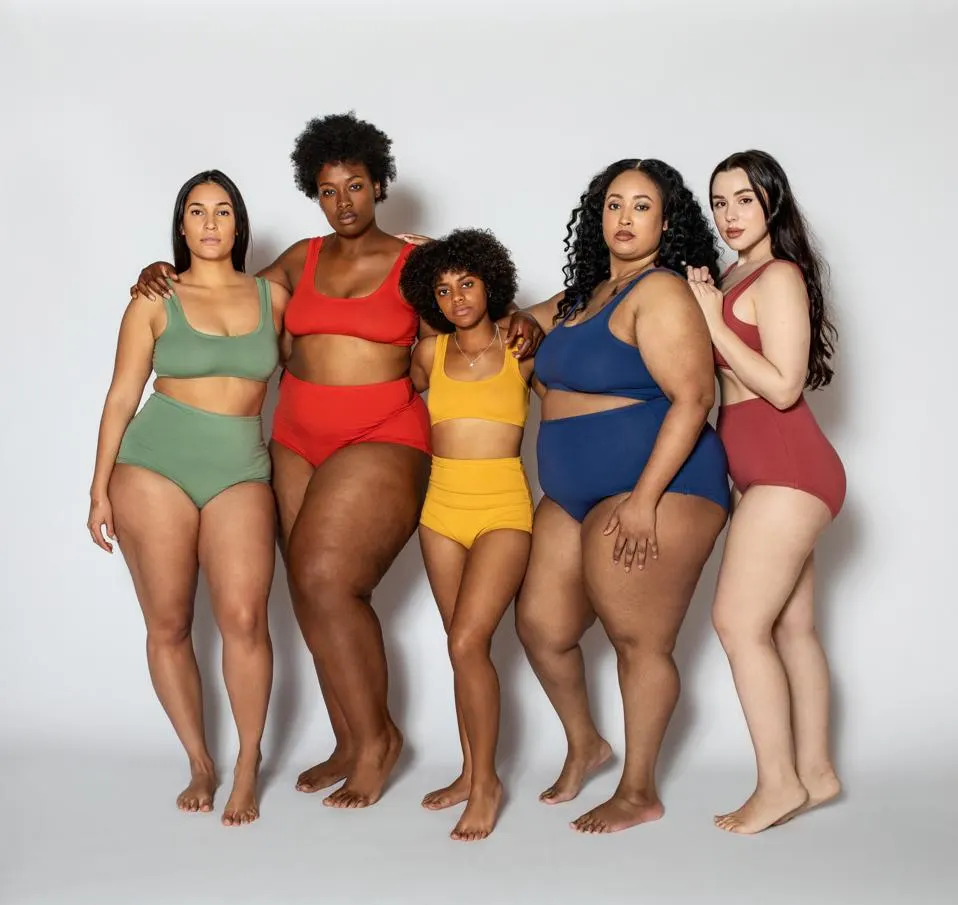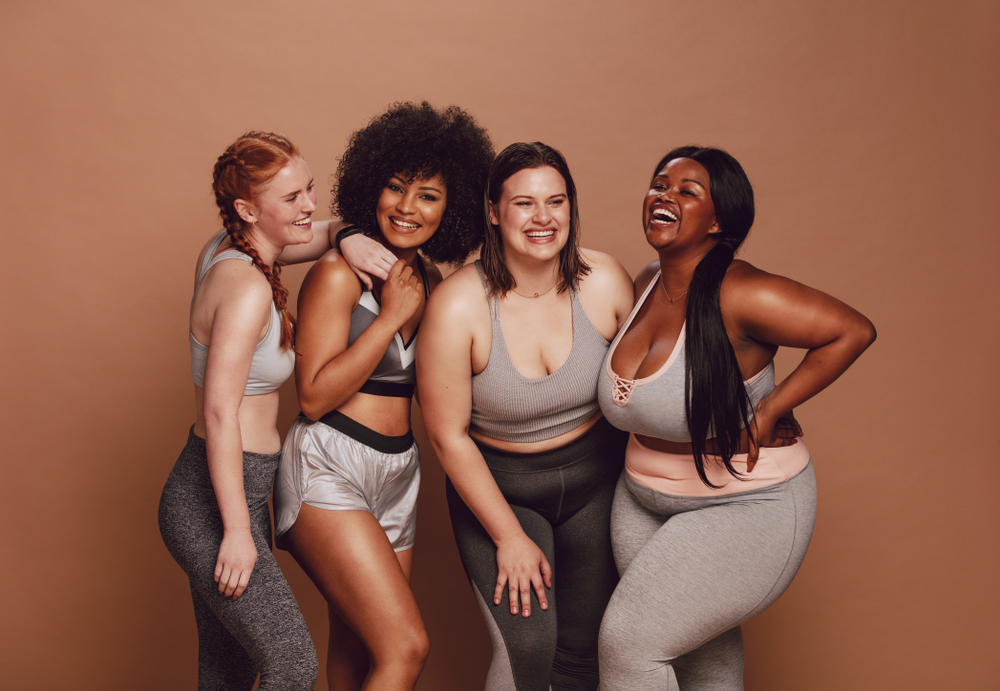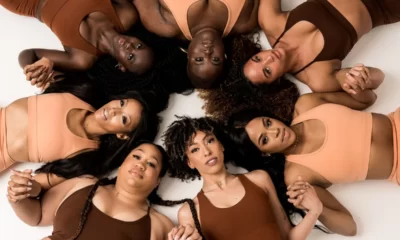FASHION
Body Positivity & Self-Acceptance: Embracing Who You Are
Published
8 months agoon
By
wpadminee
In today’s world, where media and society often promote unrealistic beauty standards, the concepts of body positivity and self-acceptance have gained significant attention.
These movements encourage people to love and accept their bodies, regardless of shape, size, or appearance. This article explores the importance of body positivity and self-acceptance, their impact on mental health, and ways to cultivate a more positive self-image.
Understanding Body Positivity and Self-Acceptance
Body positivity is a social movement that challenges how society views the human body. It encourages people to appreciate and accept all body types, including those that don’t conform to idealized beauty standards. The movement emphasizes that all bodies are worthy of respect and love, regardless of their appearance.
Body positivity isn’t just about accepting larger body sizes; it includes acceptance of all physical attributes, such as skin colour, height, disabilities, and gender expression. The core message of body positivity is that everyone deserves to feel comfortable and confident in their own skin.
This movement has gained momentum in recent years, particularly on social media platforms where people share their stories and experiences to inspire others.
The Importance of Self-Acceptance
Self-acceptance is closely linked to body positivity but extends beyond just physical appearance. It involves embracing all aspects of yourself, including personality traits, abilities, and limitations.
Self-acceptance means acknowledging your strengths and weaknesses without harsh judgment. It’s about recognizing that you are worthy of love and respect, regardless of your perceived flaws or shortcomings.
When people practice self-acceptance, they tend to have higher self-esteem and better mental health. They are more resilient in the face of challenges and are less likely to engage in self-destructive behaviours.
Self-acceptance doesn’t mean giving up on personal growth or improvement. Instead, it provides a foundation of self-love from which personal development can occur in a healthy, positive manner.
Body Positivity and Self-Acceptance: The Impact on Mental Health
Both body positivity and self-acceptance have significant positive effects on mental health. When people feel good about their bodies and accept themselves, they are less likely to experience depression, anxiety, and eating disorders. These attitudes foster a sense of self-worth that isn’t dependent on external validation or comparison to others.
People who practice body positivity and self-acceptance often report higher levels of overall life satisfaction. They tend to have more fulfilling relationships, as they are more comfortable being their authentic selves around others.
Additionally, these positive attitudes can lead to better physical health outcomes. When people accept their bodies, they are more likely to engage in healthy behaviours out of self-care rather than punishment or a desire to change their appearance.

Challenges to Body Positivity and Self-Acceptance
Despite the benefits, achieving body positivity and self-acceptance can be challenging. Society constantly bombards us with images of idealized bodies and messages about how we should look or behave.
Social media, while sometimes a platform for positive messages, can also reinforce unrealistic standards and encourage constant comparison.
The diet and beauty industries often profit from people’s insecurities, making it difficult to escape messages that suggest we need to change our appearance.
Additionally, personal experiences such as bullying, trauma, or negative comments from others can deeply affect how we view ourselves.
Overcoming these challenges requires conscious effort and often involves unlearning harmful beliefs that have been internalized over time.
Developing Body Positivity and Self-Acceptance
Developing a positive body image and self-acceptance is a journey that requires patience and practice. One effective strategy is to consciously challenge negative self-talk. When you catch yourself thinking critically about your body or yourself, try to reframe those thoughts more positively or neutrally.
Surrounding yourself with positive influences can also make a big difference. This might mean following body-positive social media accounts, spending time with supportive friends, or reading books that promote self-love.
Engaging in activities that make you feel good about your body, such as dance, yoga, or any form of movement you enjoy, can help foster a more positive relationship with your physical self.
Practising self-care and treating your body with kindness is another important aspect of body positivity. This includes eating nutritious foods because they make you feel good, not to achieve a certain body type, and getting enough rest.
The Role of Education and Representation
Education plays a crucial role in promoting body positivity and self-acceptance. Teaching children and young adults about diverse body types, the harm of stereotypes, and the importance of self-love can help create a more accepting society.
Increased representation of diverse bodies in media, advertising, and fashion is also vital. When people see bodies like their own represented positively, it can significantly boost their self-esteem and challenge societal norms.
Many brands and media outlets are starting to recognize this, leading to more inclusive marketing campaigns and diverse casting choices. This shift not only benefits individuals but also contributes to a broader cultural change towards acceptance and celebration of all body types.
In conclusion, body positivity and self-acceptance are powerful concepts that can significantly improve mental health, self-esteem, and overall quality of life. While achieving these attitudes can be challenging in a world that often promotes unrealistic standards, the benefits are well worth the effort.
By consciously working on accepting ourselves and our bodies, challenging negative self-talk, and promoting diversity and inclusion, we can create a more positive and accepting world for ourselves and future generations. Remember, everybody is worthy of love and respect, including your own.
Visit here for more updates.
You may like
FASHION
Cobhams Asuquo’s Birthday Look Exudes Cinematic Vibe
Published
3 months agoon
January 6, 2025By
Reporter
Acclaimed Nigerian musician, producer, and songwriter Cobhams Asuquo has marked his 44th birthday with a striking professional photoshoot that showcases his bold fashion choices and artistic vision.
The celebrated artist selected an elegant ensemble featuring a dramatic, floor-length black robe, which has been thoughtfully embellished with vibrant, multicoloured fringe detailing along the hemline, wrist cuffs, and shoulder areas.
To complement this regal attire, Asuquo incorporated sophisticated accessories. This includes a well-crafted black hat, refined dark sunglasses, and carefully selected silver jewellery pieces.
The look creates a cohesive look that reflects both sophistication and artistic flair. The overall aesthetic of his birthday photographs evokes a cinematic quality, demonstrating his keen eye for visual presentation alongside his well-known musical talents.
Asuquo, who has garnered significant recognition for his work on notable soundtracks including “Everybody Loves Jenifa” and the festive romantic comedy “Christmas in Lagos,” shared these photographs on social media with a characteristically engaging message.
His caption, written in Nigerian Pidgin English, expressed optimistic sentiments about the year ahead, stating, “Year wey go sweet na January 6 we dey know. Happy birthday to me.”
The birthday photoshoot stands as a testament to Asuquo’s multifaceted artistic expression, seamlessly blending musical accomplishment with visual creativity.
His choice of attire and styling demonstrates a sophisticated understanding of fashion as a medium for personal expression, while the professional quality of the photographs underscores his commitment to excellence across all creative endeavours.
See the photos below.
Check out more fashion updates here.
FASHION
4 Ways You Can Slay This Christmas Season
Published
3 months agoon
December 22, 2024By
wpadminee
The Christmas season bursts with joy, love, and celebration, making it the perfect time to slay your unique style and make a statement.
From dazzling holiday parties to cosy family gatherings and magical moments spent soaking in the festive atmosphere, this time of year offers countless opportunities to stand out and showcase your personal flair.
Whether you’re dressing to impress at a glamorous event or keeping it chic for an intimate get-together, embracing the spirit of the season through your fashion choices is a fantastic way to shine.
To help you slay this Christmas season with confidence and style, here are four practical and inspiring tips:
1. Elevate Your Holiday Wardrobe
One of the easiest ways to slay this Christmas season is to elevate your holiday wardrobe. Invest in a few key pieces that can be mixed and matched to create different looks. A festive sweater, a sparkly dress, or a stylish pair of boots can instantly elevate your outfit.
Don’t be afraid to experiment with colours, patterns, and textures. A bold red dress, a plaid skirt, or a velvet blazer can add a touch of holiday cheer to your look.
Remember, the key to slaying this Christmas season is to feel confident and comfortable in what you’re wearing. When you feel good, you look good.
2. Embrace Festive Makeup
Makeup is a great way to enhance your natural beauty and add a touch of holiday glamour. Experiment with bold lips, shimmery eyeshadow, and dramatic eyeliner.
A classic red lip is a timeless choice for the holidays. It’s bold, and elegant, and can instantly elevate any outfit.
If you’re feeling adventurous, try a smoky eye or a colourful eyeliner. These looks are perfect for a holiday party or a night out.
Don’t forget about your skin! A flawless complexion is the foundation of any great makeup look. Use a hydrating moisturiser, a primer, and a long-lasting foundation to create a smooth, even canvas.
3. Accessorise with Holiday Cheer
Accessories are the perfect way to add a touch of personality to your holiday look. A statement necklace, a pair of sparkly earrings, or a festive hair accessory can instantly elevate your outfit.
Don’t be afraid to mix and match different accessories. A bold necklace, a delicate bracelet, and a pair of statement earrings can create a stunning look.
Remember, the key to slaying this Christmas season is to have fun with your accessories. Experiment with different styles and colours to find what works best for you.
4. Nail the Holiday Hair
Your hair is an important part of your overall look. A stylish hairstyle can complete your outfit and help you slay this Christmas season.
A classic updo, a sleek ponytail, or loose waves are all great options for the holidays. If you’re feeling adventurous, try a festive hair accessory, like a sparkly headband or a pair of reindeer antlers.
Remember, the key to slaying this Christmas season is to choose a hairstyle that suits your face shape and personal style.
By following these four tips, you can slay this Christmas season. Remember, the most important thing is to have fun and express your personal style.
For more fashion tips, check here.
FASHION
How To Style A Jean Jacket According To Denim Experts
Published
4 months agoon
December 8, 2024By
wpadminee
How to style a jean jacket becomes an art form when you understand the versatility of this timeless piece.
Denim experts are ready to rescue your forgotten jean jackets from the depths of your closet. They’ve curated a collection of foolproof styling strategies that will reignite your passion for this wardrobe staple.
The classic denim jacket transcends fleeting fashion trends, offering endless styling possibilities for every aesthetic. Fashion stylists emphasise that understanding how to style a jean jacket can transform your entire wardrobe approach.
Whether you’re aiming for a casual streetwear look, an edgy urban ensemble, or a sophisticated layered outfit, the denim jacket serves as your ultimate fashion chameleon.
Seasoned fashion professionals reveal that mastering how to style a jean jacket requires a blend of creativity and strategic layering.
They recommend experimenting with unexpected pairings: combine a vintage wash denim jacket with tailored trousers, or layer a cropped version over a delicate silk dress for maximum style impact.
Denim experts unanimously agree that the key is to break traditional rules, mix textures, and let your individual personality shine through this versatile wardrobe essential.
How to Style a Jean Jacket: A Denim Expert’s Guide
The jean jacket is a timeless classic that never goes out of style. Whether you’re looking for a casual, edgy, or sophisticated look, a denim jacket can elevate any outfit.
But how to style a jean jacket? In this guide, we’ll share some expert tips on how to style a jean jacket to create various looks.
1. Classic Casual
A classic way to style a jean jacket is to pair it with jeans. When you style a jean jacket like this, it gives a timeless look that’s both comfortable and stylish.
You can opt for a light wash denim jacket with dark wash jeans or vice versa. Add a simple white t-shirt and sneakers to complete the look.
2. Edgy and Cool

To achieve an edgy look, pair your denim jacket with leather pants or a leather skirt. This style is perfect for a night out or a music festival. You can also add a graphic tee or a band t-shirt to complete the look.
3. Feminine and Chic
To create a feminine and chic look, pair your denim jacket with a floral dress or a skirt. With this look, it is perfect for a brunch date or a casual day out. You can also add a pair of heels or boots to elevate the look.
4. Layering Magic
Layering is a great way to style a jean jacket. This can create a stylish and cosy look. You can layer it over a sweater, a hoodie, or a flannel shirt.
5. Accessorise, Accessorise, Accessorise
Accessories can elevate any outfit, including one with a denim jacket. This can add a personal touch to your look. You can add a scarf, a hat, or a pair of sunglasses.
6. Colour Blocking
Colour blocking is a great way to add a pop of colour to your outfit. If you know how to style a jean jacket like this, it can create a bold and stylish look. You can pair your denim jacket with a brightly coloured top or bottom.
7. Denim on Denim

Denim on denim is a classic look that can be both stylish and comfortable. Like this, it can be a bit tricky, but with the right styling, you can pull it off. The key is to choose different shades of denim.
8. The Oversized Look
Oversized denim jackets are trendy and comfortable. Create a relaxed and effortless look with this style. You can pair it with leggings, jeans, or a skirt.
9. The Belted Look
Belting your denim jacket is a great way to cinch your waist and create a more flattering silhouette. This can be a stylish and practical way to wear your denim jacket.
10. The Layered Look

Layering your denim jacket over a dress is a great way to add a casual touch to a feminine look. This can create a stylish and versatile outfit.
The most important thing is to experiment and find what works best for you. With a little creativity, you can create countless stylish looks with a denim jacket.
For more fashion tips, visit here.
Latest


Samsung Galaxy S25 Series Sets The Standard Of AI Phones As A True AI Companion
Samsung Galaxy S25 series sets the standard of AI phones as a true AI companion …Pioneering the multimodal era with...


5 Things To Expect In Afrobeats In 2025
Afrobeats is poised to reach unprecedented heights in 2025 as Nigerian music continues its remarkable global ascent. The genre’s explosive...


Here Are The 7 Most Ancient Countries On Earth
The oldest countries in the world stand as remarkable testaments to human civilisation, each containing landscapes and monuments that narrate...


Why Self-Reflection Is More Important Than Resolutions
Millions of people embark on a yearly ritual: they sit down with a notebook and pen, eager to craft a...


Nollywood Director, Kemi Adetiba Teases King Of Boys 3
Nollywood director Kemi Adetiba has revealed that another instalment of King of Boys will be released on December 25, 2025....


John McEnroe Says He Can Be The Commissioner Tennis Needs Amid Doping Crisis
Recent doping controversies involving top players have not damaged tennis’s reputation, but John McEnroe believes that appointing a single commissioner...


“Everybody Loves Jenifa” Becomes Nollywood’s Highest-Grossing Film Of All Time
Nollywood filmmaker Funke Akindele has achieved a historic milestone with her latest film, “Everybody Loves Jenifa.” The film has officially...


FG To Premiere TV Series, “Hidden Riches” On Mining Sector On January 25
Nigeria’s Federal Government will launch an ambitious television drama series focused on the nation’s mining sector, premiering “Hidden Riches” on...


Qing Madi Delivers A Soulful Performance Of “Favourite Pyscho”
Rising Afro-RnB sensation Qing Madi launches into 2025 with a mesmerising performance on the prestigious COLOURS platform, showcasing her latest...


Taiwo Awoniyi’s First Goal Of The Season Seals Nottingham Forest’s Win Over Wolves
Taiwo Awoniyi made a triumphant return to Premier League action. He scored in stoppage time to help Nottingham Forest crush...
-Ad-






